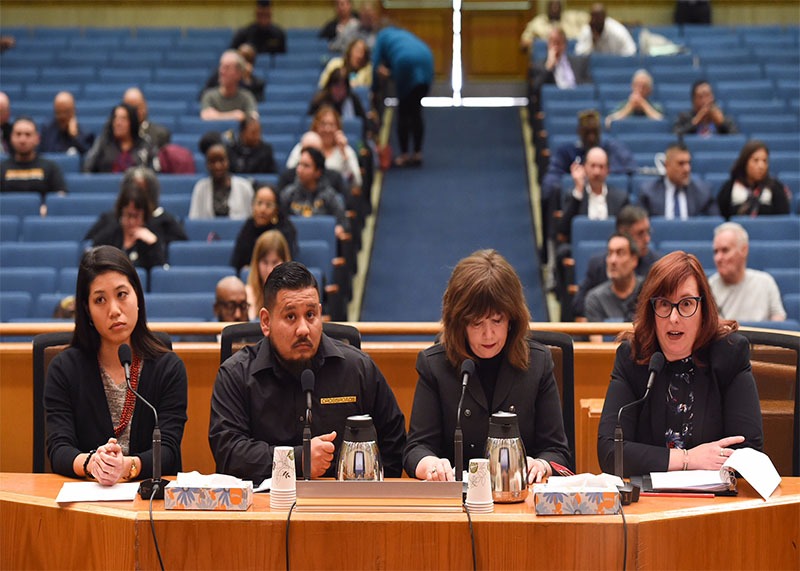27 Feb Rehabilitation Wins

Deputy Public Defender Rourke Stacy-Padilla (far right) speaks out against chemical spray on youths during Feb. 19 Board of Supervisors meeting.
After reports of continued abuse, the LA County Board of Supervisors unanimously approved a phased elimination of chemical spray in juvenile facilities by year’s end.
The Board’s action came after an afternoon of compelling testimony, including remarks by Deputy Public Defender Rourke Stacy-Padilla.
“The disturbing overreliance of pepper spray has significant and traumatic life-changing consequences for children in custody,” Stacy-Padilla began at the Feb. 19 supervisors’ meeting.
She gave supervisors and the audience a few disturbing examples, noting a youth who wore a helmet because her mental health issues were so severe she was banging her head on a wall — yet she was pepper sprayed.
Another child was pepper sprayed then left alone in his room, Stacy-Padilla continued. He passed out and was awakened by the words ‘code blue!’ and CPR being performed on him before he was rushed to the hospital.
“The LA County Public Defenders know that the youth population has significantly higher rates of trauma, mental health and other issues that make them particularly vulnerable,” said Stacy-Padilla, an 18-year veteran who trains attorneys in the Juvenile Division.
The vote came after the County’s Office of Inspector General recent report of activities inside juvenile halls and camps, chronicling potential misconduct by officers and an increase in chemical spray use.
The County Probation Department, which manages the detention and supervision of thousands of youths involved in the justice system, has two months to create a plan to halt the use of “oleoresin capsicum,” known as OC or pepper spray.
Public Defender Ricardo García told the Board, “These young people, these boys these girls need to be treated really the way we treat our own childr

Public Defender Ricardo Garcia (right) advocates for the banning of chemical spray for the third time.
en. And with the same dignity and respect we would expect our children to be treated if they were in those halls.”
García pointed to a part of the OIG’s report that described some probation officers who stated they have no need to use chemical spray because they build rapport with the youths.
“A real part of the solution exists within the very institution, which are those individuals who do care, go to them work with them,” García told the Board. “Because those are the ones my attorneys and my kids tell me do it right. Find them, reward them, leverage them.”
Prior to casting her vote, Chairwoman Janice Hahn spoke directly to García, who had addressed the Board on the issue twice before.
“May I say to our Public Defender, I was very touched by your remarks at the meeting where you talked about your clients,” Hahn said. “And that made me think a lot about how I felt about the use of pepper spray.”
Supervisor Mark Ridley-Thomas said the use of chemical spray “has gotten to what I consider to be an unacceptably embarrassing situation.”
Ridley-Thomas said we can and should do better.
“We must build a safe and rehabilitative environment,” Ridley-Thomas said. “And we must get to what we say the mandate and mission of Probation is all about. Not about punitive or military impulses. It’s supposed to be about rehabilitation.”

